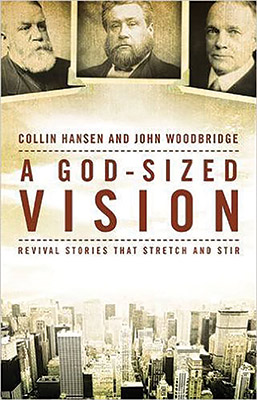Ministry Hosts Author of 'Revival Stories'
by Catherine Elvy, Staff WriterWhen Timothy Dwight took over the helm of Yale College in 1795, the institution was in a "most ungodly state," beset by rampant alcohol consumption, profanity, gambling, and other vices.
Only about 10 percent of the student body affirmed faith, while others were skeptical or "rowdies," according to A God-Sized Vision: Revival Stories that Stretch and Stir.
During an appearance in October at Cornell University, Collin Hansen, the book's co-author, told students they need to experience a "God-sized vision" of revival, and he pointed to the Second Great Awakening for inspiration.
 "We need more hope," Hansen told students involved with Christian Union's ministry.
"We need more hope," Hansen told students involved with Christian Union's ministry.Colleges remain "fertile soil" for revival, said Hansen, who also spoke to students about his career in politics and about the sting of racism in the United States.
The account of Dwight, a Yale alumnus of 1769, highlights the far-reaching impact of spiritual revitalizations on college campuses, Hansen said. "You'll know when revival comes and you see the right kind of unity," said Hansen, editorial director at The Gospel Coalition. "Others will be regarded as more important than self."
Hansen appeared twice on behalf of Christian Union's ministry at Cornell as part of the organization's strategic plan to offer high-caliber leadership training to undergraduates and to emphasize the importance of a seeking God lifestyle.
During his lunchtime session, Hansen explained how an unprecedented revival at Yale emerged on the heels of the spiritual fervor that swept the country's rugged frontier during the Second Great Awakening.
Revivals usually feature four key elements: remembrance, rejoicing, repentance, and resolve.
Shortly after taking charge of Yale, Dwight, a grandson of renowned theologian Jonathan Edwards (Yale, class of 1720), accepted a challenge to debate the authority of Scripture with students. Dwight responded with a "well-reasoned defense of the Bible's accuracy," and subsequently preached a series of sermons on biblical reliability, according to A God-Sized Vision.
By 1802, as an electrifying revival spread across Yale, about a third of students accepted Christ as their personal savior, and scores went on to enter ministry.
Hansen explained to Cornell students how revivals usually feature four key elements: remembrance, rejoicing, repentance, and resolve.
He also reflected on the theme of caring for others during his evening appearance at Cornell. That's when the former congressional aide shared some insights from his days on Capitol Hill.
"I would just love to see politicians who are humble," said Hansen, who worked for former U.S. Rep. J.C. Watts, R-Oklahoma.
Historically, Christianity, especially during the Civil Rights Movement, acted as a "leavening factor" to inspire people to consider others. However, politicians often become swept up in a "for-me and against-thee" mentality.
Hansen shared some warnings and insights about the ways modern communications influence politics and culture.
"Ultimately, fear and loathing drives just about everything in our culture. It drives our media. It's what keeps you watching cable news. It's what keeps you responding to Twitter," said Hansen.
Along those lines, politicians typically fundraise to rally against the opposition party and its evils. "People are more easily, readily motivated through fear and loathing, not faith and love," Hansen noted.
Hansen explained how an unprecedented revival at Yale emerged on the heels of the spiritual fervor that swept the country's rugged frontier during the Second Great Awakening.
Still, "the problem with fear and loathing is that it doesn't win, it doesn't solve anything."
As well, tensions are heightened in today's political climate as the "echo-chamber" nature of some social media and cable news outlets fuel partisanship. As a result, media consumers delude themselves in thinking their beliefs are more universally shared.
For believers, following Christ's commission to spread His Gospel should remain paramount. "It's no big thing to love the people who love you," Hansen said. "It's when Christians love their enemies that the world pays attention."
Christ set an example by being "relentlessly" devoted to others. "The man who prayed and sweated tears of blood in Gethsemane was not fearful. He was not full of hate for others."
Such a mindset runs counter to worldly narratives. "The Gospel demands we consider others more important," Hansen said.
Hansen's thought-provoking words resonated with Christian Union faculty and students, especially as it related to racism. "It was very powerful to hear a minister acknowledge the pain of people of color as we continue to struggle against racism," said Christopher Arce '19.
As well, "I am very grateful Christian Union at Cornell had a speaker who discussed racism, at length. I am confident this is God building leaders at Cornell to help address racism in the United States and the people who are hurt because of it."
Anna Shea, ministry fellow, agreed. "A true leader uses power to serve the powerless," she said. "That's the example of Jesus, and that's the example we get to follow as His people in America today."





